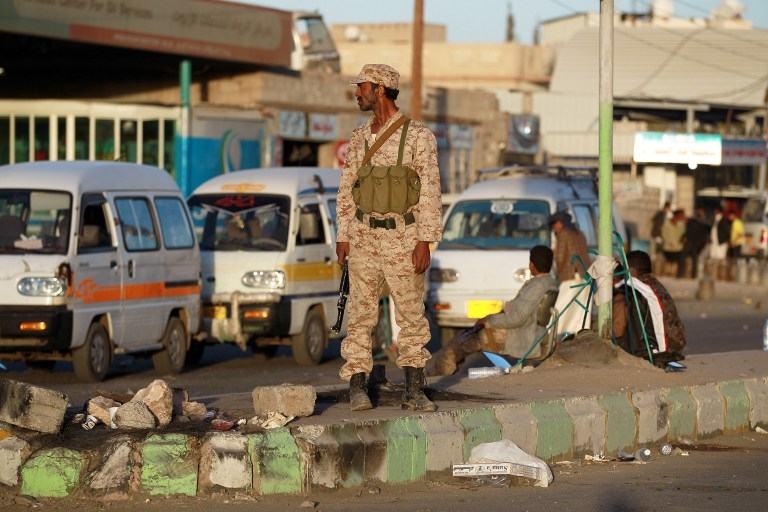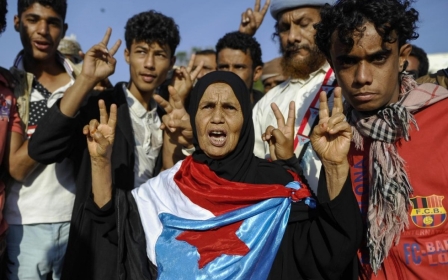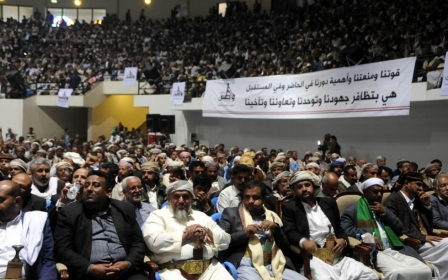Protesters fill the streets on anniversary of Yemen revolution

Thousands of men and women took to the streets across Yemen on Wednesday to mark the fourth anniversary of the country's 2011 mass uprising and to call for the disbanding of Houthi militias who last month seized key government buildings and forced president Abd Rabbuh Mansour Hadi to resign.
Shouting "We want our state back!" and "Down with the coup!", hundreds of young demonstrators marched down Zubari street, a busy throughfare in the capital Sanaa. The rally was later dispersed, witnesses said, by a group of armed men loyal to the Houthis, the predominantly Zaydi Shiite movement who have seized large parts of the country and emerged as Yemen's de facto rulers.
Houthi gunmen dispersed a rally in eastern Sanaa using live ammunition, Al-Jazeera's correspondent on the ground reported - there were no injuries.
"We are marching to oppose this theocratic armed militia," said Sarah Jamal, a 26-year-old sociology student and activist who took part in the rally. "This is not the Yemen we had our friends die for four years ago."
The Islah Party, the Yemeni branch of the Muslim Brotherhood and an arch-rival of the Houthis, alleged on Wednesday afternoon that three of their leaders had been "kidnapped" by Houthis hours after taking part in a demonstration against the militia.
According to a statement published by Islah, the three were driven to an "unknown location" after being picked up in central Sanaa.
The protests on Wednesday - while much smaller in size than the rallies of 2011 which ended the three-decade rule of Ali Abdullah Saleh - may represent a new challenge to the Houthi movement, who have faced little in the way of popular protest since seizing the capital in September.
The US has accused former president Saleh, who is now facing UN sanctions, of aiding and using the Houthi dissident group to "create enough instability to stage a coup".
Embassies close
The protests came the day after the US and the UK shut their embassies in Yemen and evacuated all staff "due to the deteriorating security situation in Sanaa".
"The Houthis are too unpredictable... embassies were being hassled by them," a Western diplomat in Sanaa, who did not wish to be named, told Middle East Eye. The diplomat said "it was hard to say" when it would be stable enough for staff to return.
On Wednesday CNN reported that Houthi fighters had seized control of the embassy cars used to transport diplomats to Sanaa International Airport, and confiscated the weapons of US Marines who had been gaurding the installation.
The actions of the Shiite Muslim fighters, who have called for government reform and an end to corruption, have drawn criticism from across Yemen's political spectrum, especially after their declaration on Friday that they were dismissing the national assembly and would form a new government.
The move, condemned by the UN, Washington and Gulf leaders, has added to fears in the US and neighbouring oil giant Saudi Arabia that Yemen, which is home to an active al-Qaeda wing, is on the verge of becoming a failed state.
Even after the UN managed to bring political factions to the negotiating table again on Monday, two parties walked out - the Nasserist Unionist People's Organisation and the Sunni Islamist party Islah - complaining of threats from the Houthis.
A main sticking point, according to Baraa Shiban, who attended the UN-led mediation efforts as a youth representative, centers on discussions about if and how Houthi militiamen should be integrated into the armed forces.
"There was a joint plan between Houthis and security forces that would allow the latter, to replace the militias, but the Houthis kept avoiding that," said Shiban.
Shiban said that some Yemeni officials had grown frustrated at what they see as an unwillness to compromise on the part of the Houthis who are still holding Hadi, the prime minister and a handful of officials under house arrest.
"Government officials are saying to the Houthis: 'we’re not just here to give you legitimacy, we’re here to find a solution.' There is a lot of fear that if a new prime minister is appointed and the Houthis are unhappy, they will do the same again and topple him," he said.
On Tuesday, Shiban pulled out of the negotiations.
"I don’t think there will be any solutions through politics," he said.
As politicians and Houthi representatives in the capital search for a political pact, the rebel group's advance continues. Residents said Tuesday the Houthis had seized Baida, capital of the southern central province of the same name.
In Tuesday's fighting, residents of Baida said elements of the Republican Guard still loyal to Saleh had supported the Houthis in the heavy combat that led to the city's fall.
A tribal source told Anadolu Agency that armed tribesman had killed nine Houthis and abducted six others during the clashes. Another 15 people were injured, according to an anonymous source.
Speaking in a televised address as the talks carried on at a Sanaa hotel, 32-year-old Houthi leader, Abdelmalek al-Houthi, said "it is in the interests of everyone, both inside and outside the country, that Yemen be stable".
"The interests of those who bet on chaos and want to hurt the economy and security of the people will suffer," the Shiite militia leader warned.
In particular, he singled out the Sunni monarchies in the Gulf, who have vowed to defend their interests in the face of what some are calling a coup.
'Fears unfounded'
Addressing his adversaries, Houthi proposed what he called "a partnership" under the "constitutional declaration" by which the militia seized power Friday.
He took particular aim at Islah, one of the fiercest opponents of his militia, urging it to give up an ideology "that excludes the other".
The Houthi takeover has drawn international condemnation, with UN chief Ban Ki-moon calling for Hadi, who has resigned, to be restored to power.
"The situation is very, very seriously deteriorating, with the Huthis taking power and making this government vacuum. There must be restoration of legitimacy of President Hadi," Ban said.
New MEE newsletter: Jerusalem Dispatch
Sign up to get the latest insights and analysis on Israel-Palestine, alongside Turkey Unpacked and other MEE newsletters
Middle East Eye delivers independent and unrivalled coverage and analysis of the Middle East, North Africa and beyond. To learn more about republishing this content and the associated fees, please fill out this form. More about MEE can be found here.




